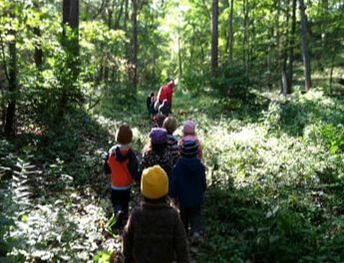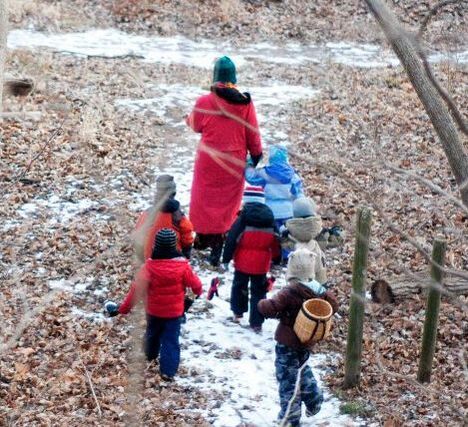Our Schedule & Rhythms
|
Prairie Flower's preschool programs now run year-round, including over the summer (though with the option to enroll for Aug-May only). We offer our Morning Song preschool program Monday-Friday from 8-11:30 a.m., and our Day Song preschool program Monday-Friday from 8 a.m.-5:30 p.m., both with two-, three- and five-day options.
Rhythm of the Day Rhythm is central to all we do at Prairie Flower. Carried along through verse and song, daily rhythms include preparing snack, playing, tidying, singing, eating, washing, listening to stories and playing outside. In the security of this rhythmic context, children feel free to participate in a wide variety of experiences. Weekly rhythm creates predictability: The child anticipates "painting day," "bread-making day" or "porridge day." These activities change with the seasons, reflecting the rhythm inherent in the natural world. The morning is longer than other preschool programs to enable a satisfactory length of time for indoor and outdoor playtime, and to allow for comfortable transitions through the morning's activities. |
Daily Rhythm
|
Morning:
|
Afternoon:
|
Weekly Rhythms
|
|
A Deeper Look at Our Days
Outside Activity and Play Time
"Oh, where do you come from, you little flakes of snow?"
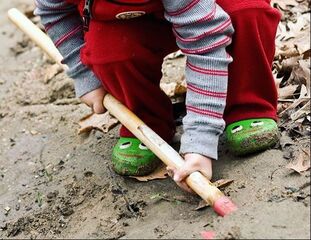
The children go outdoors daily to experience the natural world in all its seasons. Whether walking on the trail by the creek or playing with wagons, wheel barrows and trowels in the sandbox or garden of our play yard, the landscapes transform daily as the children bring their own impulses into play.
These experiences are in direct contrast to the increasing -- and worrisome -- trend in society today toward less time and places to play, and more time spent indoors watching TV, playing video games or sitting in front of computers and other digital devices.
Yet research has shown that too much screen time can be harmful to children's developing brains. Young children, instead, need an environment and lifestyle to fully develop their sensorimotor functions that are necessary for intellectual function later.
Children who are given the chance to experience nature year-round can enter deeply and comfortably into later studies of plants, animals, weather and other sciences.
These experiences are in direct contrast to the increasing -- and worrisome -- trend in society today toward less time and places to play, and more time spent indoors watching TV, playing video games or sitting in front of computers and other digital devices.
Yet research has shown that too much screen time can be harmful to children's developing brains. Young children, instead, need an environment and lifestyle to fully develop their sensorimotor functions that are necessary for intellectual function later.
Children who are given the chance to experience nature year-round can enter deeply and comfortably into later studies of plants, animals, weather and other sciences.
Story Time in the Woods
"Mother of the fairy tale, take me to your shining land."

Our woodland storytelling nook has been fashioned from branches and a fallen tree at the bottom of the hill. After the children have had ample play time in the woods, we walk to this specific area for a fairytale, folk tale or nature story. After having heard a particular story for several days, the children may tell the story or the teacher might tell it using puppets.
The children relish trying out different roles, and they enjoy dressing up in simple cloaks and scarves to create the cast of characters. Stories are carefully chosen for their theme and use of language. Teachers learn all stories by heart so nothing stands between the children and the story, and the child's own ability for inner imagery is strengthened.
This capacity for inner imagery is crucial for grasping the written word later in reading.
The children relish trying out different roles, and they enjoy dressing up in simple cloaks and scarves to create the cast of characters. Stories are carefully chosen for their theme and use of language. Teachers learn all stories by heart so nothing stands between the children and the story, and the child's own ability for inner imagery is strengthened.
This capacity for inner imagery is crucial for grasping the written word later in reading.
Circle Time
"Let's make a circle like the circle of the sun."
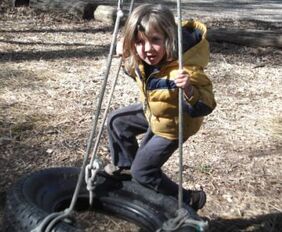
As the children gather in a circle, they are led in songs, poems and seasonal finger plays, integrating their desire to imitate what they experience. There is a healthy flow between large and small movements, hearty and quiet voices, quick and slow actions and movement in all directions. Circle time repeats each day, with elements that change with the nuances of season and the needs of the group. This continuity lets the children fully enter the world of circle time with their unconscious movements and participation in song.
During this time, many faculties are exercised that help develop foundational skills essential to language development, such as:
During this time, many faculties are exercised that help develop foundational skills essential to language development, such as:
|
|
|
Small motor skills related to reading and writing depend on the mastery of these movements.
Indoor Activity and Creative Playtime
"Rinca, ronca, rosey ray. Welcome, welcome this good day."
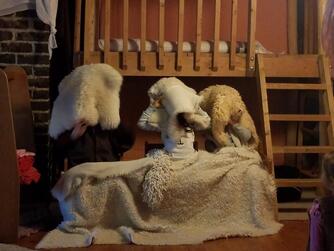
The children have a long period during which they join in a daily activity such as painting, making the day's nutritious snack or seasonal crafting.
Our program allows ample time for children to follow their own imaginative impulses, to play with the many natural materials and playthings in the room and to look at books. Playtime ends with everyone tidying up the room and putting all the toys carefully to rest.
Preschool-aged children learn about the world through taking in many experiences and then practicing them through imitative play.
Our program allows ample time for children to follow their own imaginative impulses, to play with the many natural materials and playthings in the room and to look at books. Playtime ends with everyone tidying up the room and putting all the toys carefully to rest.
Preschool-aged children learn about the world through taking in many experiences and then practicing them through imitative play.
Snack Time
"Blessings on our food and blessings on our friends."
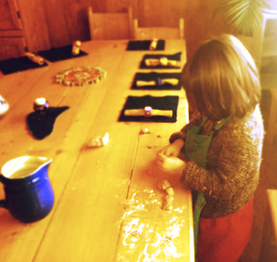
We provide children with wholesome, warm food in a lovely atmosphere. Just as time to play in nature nourishes the senses, healthy food is important to children's physical and emotional development. The snack table is set beautifully with place mats and napkin rings.
After a verse of thanks for our food and friends, everyone eats wholesome (and tasty!) organic food. We emphasize grains that nourish a growing body, along with vegetables and sustaining proteins like nuts, beans and nut butters. Meals are vegetarian to accommodate the potential eating preferences of all our families, and we also pay attention to food sensitivities of our students when planning meals.
Snacks include menus such as:
Our food comes from Wheatsfield Co-op, a natural foods store in Ames. After snack the children wash their own dishes in warm, soapy water. We strive to foster a sense of gratitude, courtesy and warmth during snack time.
After a verse of thanks for our food and friends, everyone eats wholesome (and tasty!) organic food. We emphasize grains that nourish a growing body, along with vegetables and sustaining proteins like nuts, beans and nut butters. Meals are vegetarian to accommodate the potential eating preferences of all our families, and we also pay attention to food sensitivities of our students when planning meals.
Snacks include menus such as:
- steel-cut oatmeal with almond milk, currants, cream, pumpkin seeds, cinnamon and fruit
- sweet potatoes with celery sticks and peanut butter
- stone soup featuring contributions of beans, an assortment of vegetables and whole grains contributed one day a week by enrolled families, along with vegetable bouillon, nutritional yeast and Bragg's amino acids (if the children opt)
- homemade whole wheat bread with honey butter or nut butter, cheese and fruit
Our food comes from Wheatsfield Co-op, a natural foods store in Ames. After snack the children wash their own dishes in warm, soapy water. We strive to foster a sense of gratitude, courtesy and warmth during snack time.

